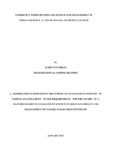| dc.contributor.author | LUYIMBAZI, James | |
| dc.contributor.author | Kyohairwe, Stella(Supervisor) | |
| dc.contributor.author | Nabaho, Lazarus(SUPERVISOR) | |
| dc.date.accessioned | 2017-07-26T09:16:51Z | |
| dc.date.available | 2017-07-26T09:16:51Z | |
| dc.date.issued | 2015-01 | |
| dc.identifier.citation | APA | en_US |
| dc.identifier.other | 10/MMS/UBG/23/029 | |
| dc.identifier.uri | http://hdl.handle.net/20.500.12305/221 | |
| dc.description | A Dissertation Submitted to the School of Management Sciences in Partial Fullfillment of the Requirements for the Award of a Masters Degree in Management Science in Urban Governace and Management of Uganda Management Institute | en_US |
| dc.description.abstract | The inability of municipalities to handle the increasing amount of waste generated is a growing problem in most developing countries. The study examined how community participation affected solid waste management in Urban Councils, a case study of Masaka Municipal council. A theoretical framework was developed employing the Institutional Theory and the Waste Management Theory, which were used as a basis to compare theoretical and actual practices when analyzing waste management practices in municipalities. The report shows that despite some hurdles, there are some municipalities which have addressed the waste management problem using community participation in their localities. Both qualitative and quantitative approaches were been used to obtain data that was analyzed to obtain key findings based on specific objectives that included: a positive correlation results for planning (.179**), implementation (.595**) and M&E (.431**) on Solid Waste Management. Findings indicated that there was very low community participation at the planning level and very poor community participation at the implementation and Monitoring and Evaluation levels to contribute to effective solid waste management in Masaka municipal council. There has been a big communication gap between the community, elected leaders/councilors and Masaka municipal council hence the community’s interests, views, activities and challenges in SWM were not being addressed. The study recommends that the communication gap be addressed and that all stakeholders should be encouraged to participate at all levels of managing waste for purposes of contributing towards an efficient solid waste management system. | en_US |
| dc.language.iso | en | en_US |
| dc.publisher | Uganda Management Institute | en_US |
| dc.subject | Community Participation | en_US |
| dc.subject | Solid Waste Management | en_US |
| dc.subject | Urban Councils | en_US |
| dc.subject | Masaka Municipal Council | en_US |
| dc.title | Community Participation and Solid Waste Management in Urban Councils: A case of Masaka Municipal Council | en_US |
| dc.type | Book | en_US |

